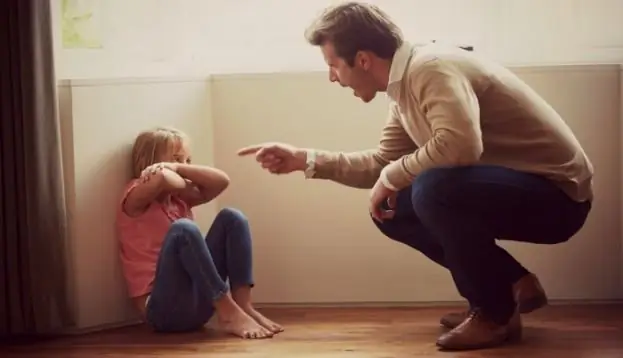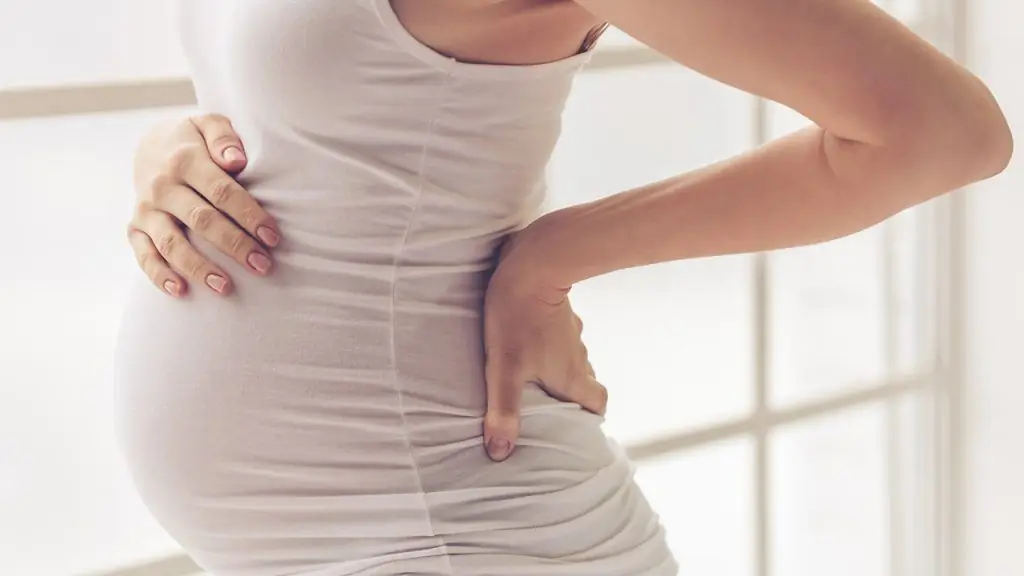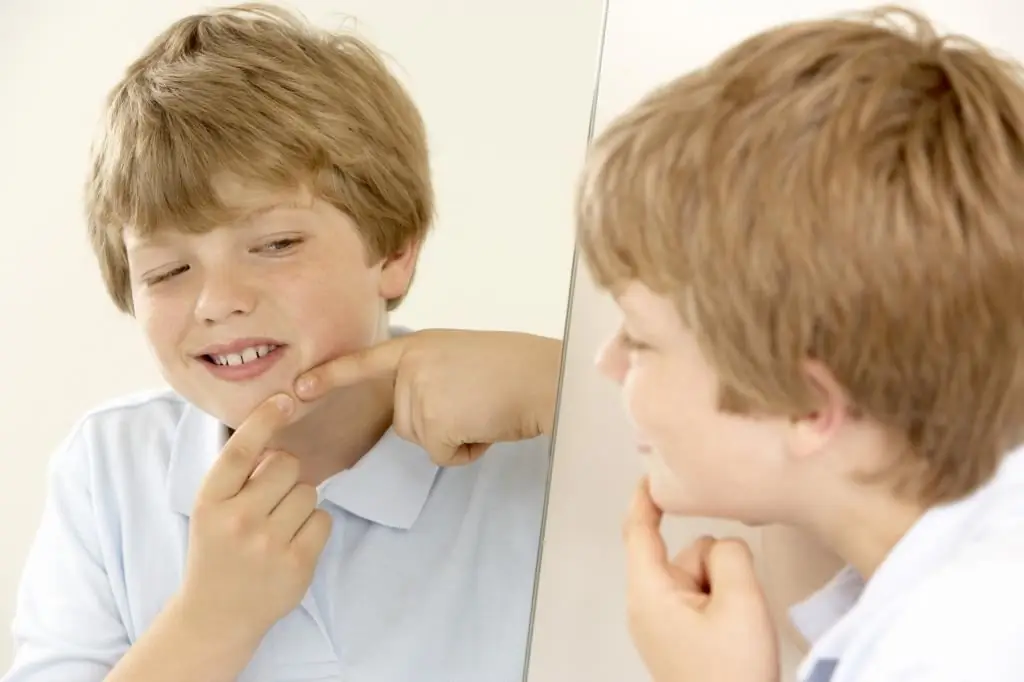2026 Author: Priscilla Miln | miln@babymagazinclub.com. Last modified: 2025-01-22 17:55:26
The appearance of pimples is one of the body's ways to adapt to various changes. They can occur in children of any age. Parents should be able to determine the type of acne that has appeared, as well as the reason that contributed to their formation. This will help cure those nasty breakouts and also prevent future breakouts.
Why kids get acne
There are a huge number of reasons why acne appears on the face of a child. They may be related to the following processes:
- Allergic reaction.
- Intestinal dysbacteriosis.
- Overheating baby.
- Viral disease.
- Improper hygiene.
- Hormonal failure.
- Increased greasiness of the skin glands.
Each of these reasons deserves a mandatory consultation with a doctor. This is the only way to prevent further rashes and alleviate the baby's condition.

Non-infectious acne in children of all ages
Regardless of age, doctors distinguish between infectious and non-infectious types of acne. The first category includes the following rashes:
- Sweating.
- Hormonal acne.
- White dots.
- Allergic reaction.
- Pustules.
In most cases, acne on the face of a child does not indicate serious he alth problems. The most harmless rashes from this list include white pimples and hormonal acne. Other types of non-infectious rashes should be checked by a doctor to determine further treatment.

Infectious acne
These types of acne are classified as dangerous rashes. They are the main symptom of infection of the body with a viral infection. Most often they appear at:
- Herpes. Eruptions red, itchy. Very similar to small bubbles.
- Folliculitis. Pimples contain pus, hurt and may burst.
- Scarlet fever. The disease is manifested by itchy and dry small pimples.
- Rubella. Pimples are pink in color and quickly spread throughout the body.
- Streptodermatitis. The rash has a pronounced red outline.
Infectious pimples on a child's face need treatment, just like the disease that caused them. Therapy is carried out with the help of medications, ointments, gels and creams for healing the skin.

How to treat infectious acne on the face
When a child is sick with a viraldisease, acne may appear on his face, which are considered one of the signs of a particular ailment. Some diseases give the first symptoms in the form of rashes on the face. In this case, parents should go to the hospital in time and diagnose the infection in the baby's body.
Further, doctors take care of his appropriate treatment. Therapy is most often carried out using antibiotics and other serious drugs. Acne on the face of a child always goes away with the infection during the recovery period. Therefore, it does not make sense to treat them separately, because they are only a consequence of the disease. However, during the treatment period, it is necessary to ensure that the child adheres to the following recommendations:
- Pimples should not be squeezed, scratched or peeled off. Otherwise, after recovery, scars will remain on the face and body.
- In order not to damage the wounds, you need to put special soft mittens on the child’s hands every night, which will not allow pimples to be torn off the face.
- Every day, treat the rash with a bactericidal solution.
If you follow these rules, the recovery of the child will be much easier.
Acne in babies
After birth, the child's body has to adapt in every possible way to environmental conditions. He begins to live and develop separately from the womb. Because of this new condition, his internal organs and skin begin to work even more actively. Therefore, many parents often face such a nuisance as acne in children.
In infancy, a child's rashes are white and red. The most harmless are small white pimples of a hormonal nature. They appear in the baby immediately after birth and can disturb parents for a short period of time. Rashes are localized on the forehead, eyelids, under the eyes, and also on the cheeks. Pimples of this type are very similar to small white tubercles. They don't hurt and rarely itch. Therefore, parents manage to quickly rid the baby of them.
Red acne on the face of a child is not always considered a harmless symptom. Such rashes can be caused by an inflammatory process in the body, which caused infection with microbes or viruses. They are also the result of improper hygienic care for the baby and non-compliance with the room temperature that is comfortable for him. Regardless of the cause of the appearance of red acne on the face of a child, you should immediately seek the advice of a pediatrician.

Types of acne in babies
During the first year of life, many children develop rashes on the skin of the face and body. They are mostly white or red. To determine the cause of their appearance, it is necessary to be able to distinguish between all types of acne, which most often appear in babies.
Milia are white and small pimples on the baby's face that do not cause him concern. With the appearance of such acne on the face of a month-old baby, you do not need to worry. This type of rash is only a consequence of the normal functioning of hormones. They do not need treatment and go away on their own.
Infantile acne is a small purulent pimples,manifested under the influence of female hormones of the mother. They should not give cause for concern, but with persistent rashes, it is better to seek the advice of a doctor.
Miliaria is a very common occurrence in infants, which is manifested by reddening of the skin in the neck and armpits. Such a deviation often occurs after non-compliance with the temperature regime in the room or on the street.
Another type of the most frequent rashes in babies are allergic pimples. They can be formed from malnutrition of the mother, unsuitable children's cosmetics, as well as from washing powder with an aggressive composition. If the baby is a month old, and acne on the face causes great concern, it is better to consult a doctor.
Treating acne in babies
Depending on the type of acne, your doctor may prescribe the following treatments:
- Cream "Bepanten" or powder of the same company. In this way diaper rash and prickly heat are treated.
- Baths with the addition of herbal decoctions: sage, calendula, chamomile, string herbs, etc. With the help of medicinal herbs, you can remove white pimples on the face of a child, as well as remove all redness.
- For allergic rashes, a nursing mother is prescribed a strict diet. If the baby eats artificial mixtures, it is necessary to reconsider his diet.
- Pimples on the child's body can be wiped with Furacilin.
- Some rashes will need to be treated with antihistamines.
- In case of chickenpox, the skin will be treated with ordinary brilliant green.
Every parent should rememberthat if a child has acne on his face, it is dangerous to self-medicate. Especially when it comes to his he alth. Even the smallest red pimples on a baby's body should make adults see a doctor. Only he can prescribe the necessary treatment for the child.
Prevention of rashes in babies
To prevent the development of rashes, it is necessary to determine the causes of acne on the child's face in time, provide good skin care, and also not neglect visiting doctors. Any self-medication can harm the he alth of the baby. Regardless of the type of rash, the body is diagnosed first. Only after a comprehensive examination can the treatment and prevention measures prescribed by the doctor be carried out. When acne appears on the face and body, consultations are given by an immunologist and an allergist.
Prevention of rashes depends on the age of the child. To prevent the appearance of acne in babies, it is necessary to control the temperature regime at its location, carry out bath procedures only with organic cosmetics, and the mother will have to strictly monitor the feeding of the baby. When breastfeeding, you need to eat a strict diet, and when feeding with artificial mixtures, give preference to the most famous manufacturers.

Acne in a child of preschool and adolescence
Every mother will worry about the condition of the child when he has acne. And it does not matter how old this child will be. Parents always worry aboutthe well-being of your child. Therefore, the main causes of acne in preschool and adolescence should be identified:
- Teething. This process can cause a lot of discomfort to the baby, as well as provoke rashes on the face. The place of localization of such acne always becomes the area around the mouth. The reason for this is the increased salivation of the child during this period.
- Allergic reaction. Pimples of different diameters can occur in children due to allergies. These rashes are known for their rapid appearance. A pimple rash can spread across the face instantly. However, they are almost always accompanied by itching, runny nose, sneezing or tearing. Treatment is carried out by eliminating the allergen.
- The reaction of the body after vaccination. It can be extremely individual. Therefore, it is impossible to diagnose them at home. If pimples appear after vaccination, you should immediately consult a doctor.
- Poor personal hygiene. Children's skin is very thin. Therefore, she is sensitive to the lack of high-quality cleansing. Teenagers may develop blackheads and then acne. Therefore, you need to purchase soft and gentle cosmetics for washing.
- Insect bites. Red and swollen pimples in a child can mean insect bites. Most often they are located unevenly and in different parts of the face and body. To prevent this from happening, you need to use special creams that repel insects.
- Dysbacteriosis of the gastrointestinal tract. Judging by the numerous photos, acne onon the face of a child due to stomach problems look like a small and itchy rash. It appears on the face, as well as near the growth of hair on the head.
- Puberty. Pimples of this type can look quite intimidating. However, do not be afraid and run to the doctor. Comedones, blackheads and acne appear in adolescence due to the restructuring of the body. Over time, this age-related phenomenon passes. You just need to teach your child to eat right, drink more clean water and use special cosmetics that will help get rid of acne.

What parents should do when acne appears
When a child has acne on his face, not all parents know what to do. Therefore, you need to try to prevent their occurrence. To prevent rashes in preschool children, it is necessary first of all to monitor their nutrition. In kindergarten or visiting friends, a child may eat a product that will cause him an allergy.
Particular attention should be paid to the possible localization of acne. Noticing a couple of pimples on the face, you should immediately examine the entire body of the child. Some infectious diseases appear with rashes on the face and spread throughout the body. If you do not attach importance to small pimples, you can miss the symptoms of a dangerous infection.

Prevention of breakouts in teenagers
In adolescence, you must always carefully monitor the condition of the skin of the face. Acne during this period of a child's lifemay appear due to hormonal changes in the body. The activity of the sebaceous glands begins to increase, and this provokes the development of acne and blackheads.
Do not remove pus from pimples, squeeze them or peel them off the skin. Such actions can only spread the activity of bacteria throughout the face. Pimples after that will appear even more. Parents should teach the child to personal hygiene, aimed at gently cleansing the skin and drying inflamed acne. You can prevent their occurrence by normalizing your diet, increasing physical activity and walking in the fresh air.
Recommended:
The husband hates the child from his first marriage: what to do? Consequences of a husband's hateful attitude towards his wife's child from a previous marriage

Should a woman marry with a child? Of course, when a second marriage is concluded and the spouse has children from the previous one, then on the one hand it is simply wonderful. After all, the woman decided to get rid of her past and rushed to a new life, starting all over again. However, she will no longer be able to build relationships literally from scratch
Placenta accreta: symptoms, causes, diagnostic methods, possible risks for mother and child, treatment methods and recommendations from gynecologists

The placenta is an embryonic organ that allows the fetus to receive oxygen and nutrition during pregnancy. In the normal state of the woman and the correct course of pregnancy, the placenta is attached at the top of the uterus and remains there until the very time of childbirth. After the birth of a child, it exfoliates from the wall of the uterus and comes out
Rashes on the child's body: types, causes

Every mother is familiar with the situation when a rash suddenly appears on the baby's body. Moreover, very often it is not localized, but extends to almost the entire surface of the body. Usually the first rashes appear on the cheeks. They begin to burn, become covered with small pimples, after which they peel off strongly. Then there are rashes in the child on the body, on the chest and tummy. From there, the rash spreads to the extremities
A dog has a rash on his stomach: causes and treatment

As a rule, a rash on the dog's stomach occurs due to an allergic reaction. However, there are a number of diseases that can cause the appearance of red spots and black dots on the skin of a pet. What to do if the condition of the animal's skin has noticeably worsened? What ailments can this be associated with? Let's find out about this
How to treat acne in cats? Treatment for acne in a cat on the chin

Does your purr on the skin of your chin have unsightly black dots that look like either dandruff or sand, from which there is no way to get rid of? Or maybe these rashes have already turned into pustules? Chances are you're dealing with a fairly common pet problem - acne. What is this disease, how to treat acne in cats, we will discuss today

